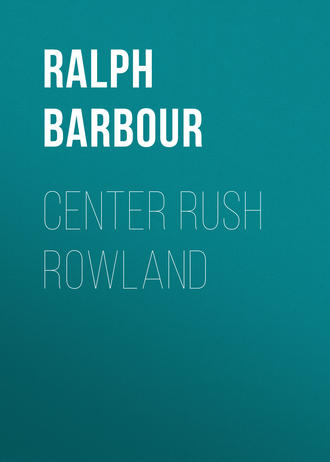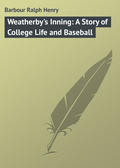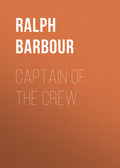
Barbour Ralph Henry
Center Rush Rowland
A tall, immaculate youth in street attire joined coach and captain. He carried a square of light board to which were held by a clamp a number of sheets of paper. Ira surmised correctly that he was the team manager. A short conference ensued between the trio and then things awoke to action.
“First squad down the field,” called the coach. “New candidates this way, please!”
The knot of players who had accompanied him on the field went off with a couple of the worn footballs, while the balance of the fellows gathered around. They represented all ages from fifteen to twenty, although there were but two or three who looked more than eighteen; and were of assorted sizes and of various builds. There were slim boys there and dumpy boys; undersized boys and overgrown boys; fat boys and lean boys; and boys who weren’t anything in particular. All wore football togs of some description, many new, more old. Here and there Ira caught sight of a brown sweater with the white P followed by the insignia “2nd,” and here and there a white sweater bearing the letters “P.B.B.C.” in brown. But for the most part the candidates, perhaps sixty-odd in number, appeared to be tyros. What the coach said to them Ira was too far distant to hear, but he spoke for several minutes amidst respectful silence. Then the group broke up and a minute later the candidates had formed three groups at different parts of the field and were passing balls to each other.
It wasn’t an exciting sight, and after a half-hour Ira pulled himself from his sun-smitten plank and made his way homeward across the campus, loitering a little in the grateful shade of the buildings. He passed three or four groups of fellows studying, or at least making a pretence of studying, under the lindens, and always he was followed by curious and faintly amused looks. He didn’t know it, however, and wouldn’t have been troubled if he had known it. It certainly didn’t occur to him that anyone could find anything unusual in his appearance now that he was wearing his blue serge. He had bought that suit in Bangor and he had the salesman’s word for it that it was absolutely the last cry in fashionable attire and that it fitted him perfectly. Perhaps, however, the salesman had been nearsighted. Let us be charitable and think so; for the fact is that that blue serge suit was too short as to trousers, leaving a painful lapse between the edge of each cuff and Ira’s low shoes – a lapse rather startlingly occupied by faded brown socks – and the coat was ungracefully long and fell away at the back of his neck. Possibly the waistcoat fitted as well as the salesman had asserted, but Ira wasn’t wearing the waistcoat today. There is no gainsaying that, judged by the standard of the flannel-garbed youths under the trees, Ira’s appearance was somewhat unusual at Parkinson.
As he crossed Washington Avenue from the centre gate and entered School Street he found himself hoping a trifle wistfully that he would find Nead in the room, for he was beginning to feel a bit lonesome and out of it. But he was destined to disappointment, for when he opened the door the room was quite empty. There were, however, evidences of recent occupation, evidences both olfactive and optical. First, there was a distinct odour of cigarette smoke, and, second, there was a note propped up against the lamp on the desk.
CHAPTER VI
THE ENEMY CALLS
The note proved to be from Mart Johnston.
“Where do you keep yourself? [he read] Come over to 16 Goss about five and play with us. Eternally and indestructibly yours, M. J.”
Ira smiled over the message as he crumpled it up and dropped it into a waste basket. The temptation to accept Mart’s invitation was strong, but he knew that he ought to at least get acquainted with some of the books piled there beside him. It wouldn’t do to leave all the studying until evening. Anyhow, five o’clock was still three-quarters of an hour away, and —
And just then the odour of stale cigarette smoke assailed his nostrils again and he frowned. Of course, if Mart wanted to smoke cigarettes it was no one’s business; at least, not Ira Rowland’s; but Ira didn’t hold with smoking for boys and he guessed he and Mart weren’t destined to continue that acquaintance after all. He wasn’t afraid that Mart would corrupt him, of course, but he didn’t see any advantage to be gained by becoming intimate with fellows who smoked. Doubtless Mart was one of the “smart class” at Parkinson, and Ira wasn’t “smart” and didn’t want to be. No, on the whole he guessed he’d let Mart Johnston slide. He was a little bit sorry, for the gay-hearted chap with his queer phrases and ready laughter was certainly likable, and an existence containing only Nead as an intimate didn’t look enticing. He didn’t even know Nead’s first name yet, he reflected – as he settled himself for study – and, in any case, he didn’t believe that he could ever grow fond of that rather unpleasant youth. He supposed, though, that he’d get acquainted with other fellows after awhile. Amongst nearly five hundred there were surely some to become friendly with! After which encouraging conclusion he opened his Greek Reader, settled his elbows on the desk and his chin in his hands and resolutely began his task.
Ten minutes later footsteps sounded outside and a knock came at the door. Ira marked his place with a finger and called “Come in!” For a moment Ira failed to recognize the boy who entered, although he knew that he had seen him. He was a finely built chap of eighteen or so, of middle height and with rather an engaging countenance. It wasn’t until the visitor had nodded smilingly, closed the door behind him and greeted Ira with a careless “Hello!” that the latter recognised him as Eugene Goodloe. Today he was wearing tennis flannels and carrying a racket in his hand. Ira arose from his chair a trifle warily.
“How do you do?” he responded gravely.
“Better than when you saw me last,” answered the caller, his smile deepening. “Mind if I sit down? I’ve had three sets of tennis and I’ve been leading a lazy life of late. I’m about all in, Rowland.”
“Of course! Have a chair!” said Ira, trying not to sound surprised. “I – er – Did you get my note?”
“Yes, a little while ago. That’s why I’m here. I thought I might as well drop around and talk things over. Say, where did you learn to punch like that, Rowland? You nearly broke my jaw!”
“Why, in the woods, I guess. Sorry if I hurt you much. Maybe I hit harder than I needed to, Goodloe.”
“Oh, that’s all right. I had it coming to me. What do you mean by the woods, though? Oh, I know! You said you lived in a lumber camp, didn’t you?”
“Not exactly,” replied Ira, seating himself on a corner of the desk. “I don’t live in a lumber camp, but I’ve spent some time in them. The lumbermen are mostly pretty handy with their fists. You sort of pick up fighting when you’re around with the drive.”
“Guess I’d better spend a few months in the Maine woods,” said Gene Goodloe ruefully. “Well, what’s your idea, Rowland? Want to try it again?”
“Any time you say, thanks.”
“Suits me. We’d better not advertise, though. Faculty’s a bit down on scraps. I don’t see why you and I can’t just take a walk, say, tomorrow morning early, eh? Do you know where the brick-yards are, over across Apple Street? They aren’t used nowadays and the fellows generally pull off their scraps there.”
“I don’t know where you mean,” said Ira, “but I can find the place all right.”
“Sure! Or you might meet me at the West Gate. It’s on our way. Any time you say after six-thirty.”
“Six-thirty will suit me. The West Gate’s the one over that way, to the left, isn’t it?”
“Yes. Of course, if you’d rather bring some fellow with you, I don’t mind. I’ll do the same, if you like. Only I don’t see any use in having a crowd, what?”
“N-no; and I don’t think I know anyone who would go with me.” He did think of Nead, but somehow Nead didn’t appeal to him in the rôle of second. “We can get along without help, I guess,” he added.
“Sure! You may have to carry me home, or I may have to lug you back,” chuckled Goodloe, “and I hope it’ll be the latter way. No use in fighting rounds, is there? Just dig in and keep at it until we’ve had enough, what?”
“I think so.”
“Good! And now that that’s settled,” said Goodloe, “I’d like to say that – well, I guess I want to apologise, Rowland, for anything I said yesterday that wasn’t decent. I had a sort of a grouch, I guess.”
“All right,” assented Ira. “Maybe I was sort of flarey, too.”
“No, you weren’t,” Goodloe laughed. “You were about as cool as they make ’em. Do you ever lose your head and get rattled?”
Ira smiled slowly. “I guess so – sometimes. I did yesterday.”
“No one would have known it! Rather jolly room you’ve got here. All alone? Oh, I see you’re not.”
“No, there’s a fellow named Nead in with me.”
“Nead? Don’t know him, I guess. But I thought you said you didn’t know any fellow who’d act as second for you.”
“Well, I did think of Nead, but – he doesn’t – ” Ira hesitated and his visitor laughed understandingly.
“Not the sort you want in a pinch, eh? Well, we won’t Nead him. Rotten pun, wasn’t it? So long, Rowland. I must be getting back to hall. Much obliged for that note, you know. Glad we got together so nicely, too. I guess there won’t be any hard feelings, no matter who pulls down the purse! Six-thirty at the West Gate then. I’ll be there.”
Gene Goodloe nodded affably and took his departure, leaving Ira looking perplexedly at the door that had closed behind him.
“I wonder,” thought Ira, “what there is to fight for? He says he was in the wrong and has apologised. I’m certainly satisfied. Then what do we scrap about in the morning?” But there was no satisfactory answer to that conundrum and he went back to his books. When, just before six o’clock, Nead came in, he had conquered his Greek lesson and had dipped into Algebra.
Nead viewed him contemptuously as he skimmed his hat across the room to his bed. “Gee,” he said in disgust, “I hope you’re not going to be a ‘grind,’ Rowland. That would be the limit.”
“Hope not myself,” replied Ira. “By the way, Nead, what’s your other name, if you have one?”
“Humphrey.”
“Thanks. Mine’s Ira.”
“There’s not much choice between them, is there?” laughed Nead. “I was named for an uncle, my Mother’s brother. How did yours happen?”
“I don’t know, I’m sure. I guess Father or Mother liked the name. I confess I’m not fond of it, but it might be worse. What have you been doing this afternoon?”
“Oh, moseying around. It’s rather a dull hole. Played some pool over on Green Street with a fellow, for one thing.”
“Who was he?” asked Ira.
“Search me. I ran across him there and he wanted to play and I took him on. He was a shark, too. I only got three games out of ten. Had perfectly rotten luck.”
“One of the school fellows, was he?”
“Great Scott, no! He was a real player. Guess I could handle any of the school chaps at pool without much trouble. Say, there’s a reception or something tonight at the Principal’s. Sort of a shindig for the new chaps. You going?”
“I think so. One of the instructors said we ought to. By the way, who’s your adviser?”
“Hale, Physics man. He looks like a pill. I’ve got a date with him at seven-thirty. Who’s yours?”
“Mr. McCreedy, the Mathematics instructor. I’m to confer tomorrow at eleven-thirty. Where do we eat tonight?”
“Let’s try the Owl Grill. This guy I played pool with says it’s swell.”
“Where is it?”
“A block this side of the station, on Maple Street. Want to start along pretty soon? I’m starved.”
“I’m ready now,” responded Ira, marking his place and closing his book. “Done any studying yet?”
“Me? No, I’ll take a fall out of it tonight. It looks like a cinch. The Algebra’s review stuff. I’ve had it already. And the Latin’s easy, too. Guess German’s the only thing I’ll mind much. How about you?”
“Looks stiff,” acknowledged Ira. “I didn’t expect to have to take French until next year. Languages were always hard for me. I’ve elected Greek instead of German. I don’t see why a fellow needs much German, do you?”
“I don’t see why he needs any. Or French, either, for that matter. Latin’s enough, I think.”
“Really? But French is different from German. I mean, it’s a sort of universal language – ”
“Sure. I know. But why not learn it in college? That’s time enough. My idea is that they try to teach you too blamed much at these big prep schools.”
“A good many fellows don’t go to college,” said Ira. “I’m not certain that I shall.”
“Gee, I wouldn’t miss it! If it wasn’t for going to college I wouldn’t ever waste time at a prep school, believe me. College is fun, old man. You take my advice and go. Get a move on and let’s start along. I could eat bent nails!”
The food at the Owl Grill proved excellent, but the prices were dismayingly high and the atmosphere of the place didn’t please Ira. They ate in one of the little booths that lined the walls of the restaurant, which was a bright and attractive place of many lights and black-oak panelling and cheerful pictures of hunting and coaching scenes. But after the room had filled up Ira had an uncomfortable feeling of being in the wrong place. His modest order brought an expression of disdain to the waiter’s face, and when he glanced out into the room and saw what most of the diners were surrounding themselves with he understood it. Humphrey Nead ordered as if quite familiar with that style of restaurant and bought far more food than he was able to eat and paid his check later with a lordly air.
“Some place for a one-horse town like this, eh?” he asked, looking approvingly around. “I guess it beats eating in hall, what? Sometime I’m going to have one of those planked steaks like the fat guy over there has. Bet they cost about two dollars. They ought to have music here, though. We’ve got a place in Buffalo you ought to see, Rowland. It’s got this beat a mile. Going to drink anything?”
“I guess not. I don’t like tea much, and coffee at night keeps me awake.”
“Gee, you’re a greenie!” jeered Nead. “I meant a real drink, a glass of beer or something.”
“I don’t drink beer,” replied Ira shortly. “And if you take my advice you won’t, either.”
“Piffle! I often have a glass of beer with my dinner. Don’t be a pill!”
“What you do at home is different, Nead. You’re not allowed to do it here, and if faculty found it out – ”
“What faculty doesn’t know won’t hurt it,” returned Nead flippantly. But Ira observed that he didn’t order the beer. When they had finished, Nead wanted to sit there awhile and talk, but Ira wasn’t comfortable and Nead grumblingly consented to leave. When Ira handed the waiter fifteen cents, which was the change from the dollar he had placed on his check, Nead looked even more disgusted than the waiter and ostentatiously tossed a fifty-cent piece on the cloth.
“Did you see his look when you slipped him that tip?” he asked as they passed out. “It was a study. It doesn’t do to be a piker in a place like that, Rowland. They remember it, and the next time you go there you don’t get any sort of attention. It pays to loosen up sometimes.”
“There won’t be any next time for me,” answered the other untroubledly. “I don’t like the place. And, anyway, I wouldn’t have tipped him more than fifteen cents. That’s more than enough.”
“Oh, sure! You don’t have to give anything, but they expect it, you know, and they think you’re a tightwad if you don’t come across.”
“What that waiter thinks of me doesn’t worry me a bit,” replied Ira, smiling. “It isn’t a patch on what I think of him!”
“Oh, he didn’t do so badly,” said the other carelessly. “I think it’s a pretty decent dive for a town like this. They do know how to charge, though. A fellow couldn’t eat there more than a couple of times a week, I guess.”
“I couldn’t. Suppose we look around and find a good boarding house, Nead?”
“Not on your tintype! No boarding house for yours truly! Guess I’ll go to Alumni after a week or so. I’ll be busted by that time,” he chuckled, “and you can chalk it up at Alumni until the end of the term. It’s nearly seven-thirty and I’ll have to hustle over to Goss and keep that date with Hale. See you at the party, eh?”
“All right. I’ll be there about a quarter past eight. Bye!”
Humphrey Nead turned into School Street in the direction of the campus and Ira kept on until he reached Number 200. As usual, the little tailor was hard at work under a flaring gas jet as Ira pushed open the outer door, and was humming a queer tune as he trundled the steaming goose up and down the pressing board. Ira fumbled his way up the dark staircase to the floor above and then went along the hall with more certainty in the dim radiance of the single bracket. As he passed the door of a room on the front of the house it opened suddenly and a tall form in a blanket dressing gown stood revealed in the light.
“The Peloponnesian War was 430, wasn’t it? Or was it 431?”
Ira, already startled by the sudden apparition, drew back in surprise. “I – What did you say?” he gasped.
“The Peloponnesian War,” repeated the stranger in the doorway impatiently. “What was the date?”
“I’m afraid I don’t remember,” replied Ira apologetically. “But it was somewhere around there.”
“Rather indefinite,” said the other drily. “Thought you might know. Much obliged.” He was gone and the door was closed before Ira could reply, leaving the dim impression of a thin, earnest face and a pair of big spectacles. Ira smiled as he climbed the next stairway. From the room across the corridor came the muffled strains of “Boola” punctuated by a sound that suggested the beating of a book with a ruler. Ira’s smile became a grin. Evidently “Maggy’s” was inhabited by some queer characters, he thought.
There was barely time for a letter before eight o’clock and he lighted the gas and set to work. But after writing “Dear Dad” at the top of the sheet he leaned back and began to think of that encounter with Goodloe in the morning. He found that he entertained a sentiment of cordiality toward Goodloe and the idea of standing up to him and trying to flatten his nose for him seemed somewhat ridiculous. “If only he hadn’t come around and called,” thought Ira. “He seemed such a decent chap, and apologised so nicely! Wonder why he wants to fight. I’m sure I don’t. Well, I suppose I’ll have to go through with it. I guess I can lick him, all right, but I haven’t got much enthusiasm for it. Still, if I don’t make a fight of it he will probably mess me up considerable. I guess he’s the sort that’ll bore in and take a lot of punishment, too. Bother him, I wish he was in Halifax!”
After that there was not time left for the home letter, and he spruced up a bit and trudged through School Street and then along Washington Avenue, in front of what was known as Faculty Row, and found the Principal’s residence, at the corner of the grounds, quite gay with lights within and coloured lanterns without. A thin stream of more or less embarrassed First Class fellows was ascending the steps and edging in to be greeted by Dr. and Mrs. Lane at the door of the big library. Ira liked Dr. Lane’s looks and his hearty handshake and his deep and pleasant voice. The Principal was a man still slightly under thirty, of medium height and build, clean-shaven, with rather more of the executive than the pedagog in his appearance. He held Ira in conversation a few moments and then passed him over to Mrs. Lane, a rotund, cheerful little woman who invited him to tea on Friday next at half-past four and asked him what church he attended. Ira was afterward in doubt whether he had accepted the invitation or not, but concluded that it didn’t matter. He met Professor Addicks a minute later and was flattered to discover that the professor remembered him. The professor, although Ira didn’t know it, always remembered everyone and everything. After that he met many other members of the faculty, many of whose names he promptly forgot, and talked, without being introduced, to a number of lonesome looking fellows whom he found standing around in corners or flattened against walls. Most of the guests were, of course, first year students, and Ira and some eight or nine others were the only older boys there. One small chap of fourteen whom Ira discovered in a niche between a door and a mantel in a back room mistook him for an instructor or something official, a misapprehension flattering but embarrassing. He caught sight of Nead once for a moment, but that youth was hobnobbing with a freshman in the hall and didn’t see him. Refreshments were served in the garden at nine, and after demolishing a helping of ice cream and a slice of cake Ira slipped quietly away. It wouldn’t do to stay up very late, since he had an important engagement at half-past six at the West Gate, and he had still to do some studying. What time Nead returned he didn’t know, for he was fast asleep at half-past ten.






